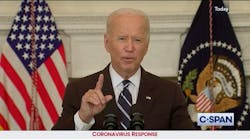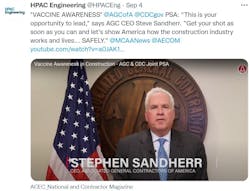Frustrated by the nation's maddening inability to control the Coronavirus's deadly new Delta variant, President Biden on Sept. 9 announced sweeping new federal measures to increase COVID vaccinations in hopes of keeping schools and businesses from sliding back into pandemic lockdowns and derailing the U.S. economy's fragile ongoing recovery.
In particular, these new steps are the first to directly target the construction industry as they will require vaccinations (or weekly tests) for all federal contractors and subcontractors, as well as private businesses with more than 100 employees. All told, more than 80 million workers are thought to be affected. Of note, the Associated General Contractors of America (AGC) estimates that roughly 50% of industry workers are vaccinated, according to AGC chief economist Ken Simonson.
Last week, President Biden drew the line. "If you want to work with the federal government and do business with us, get vaccinated," he said in a national address. "If you want to do business with the federal government, vaccinate your workforce... The Department of Labor (DOL) will require employers with 100 or more workers to give those workers paid time off to get vaccinated. No one should lose pay in order to get vaccinated or to take a loved one to get vaccinated."
According to the White House, the new mandate will arrive via an emergency temporary standard (ETS) to be issued by DOL’s Occupational Safety and Health Administration (OSHA) later this month. "The agency is developing a rule that will require employers with more than 100 employees to provide paid time off for the time it takes for workers to get vaccinated or to recover if they are under the weather post-vaccination," explained OSHA spokesperson Kimberly Darby in a statement. "This requirement will be implemented through the ETS."
Across the U.S., several Republican governors have already announced their opposition to the new federal vaccine mandates, but national polling has consistently shown 2 to 1 public support for the measures. This includes many business owners, who some believe are quietly relieved they will not have to play "the bad guy" now in implementing requirements.
"The fact that the largest employer in the U.S. (the federal government) is mandating vaccines will give comfort to private employers who have been hesitant to require vaccines," said Steve Bell, a partner at international law firm Dorsey & Whitney LLP. "The announcement is a real game-changer for many employers. Now that the federal government will be mandating vaccinations for federal employees AND contractors, the impetus for other employers to mandate vaccinations for the workforce will increase exponentially."
The move also holds legal portent, as well, he adds. "It may set the standard for what a reasonable employer should be doing in the face of this continuing epidemic," Bell says.
For their part, manufacturing employers have expressed some concern about the related costs, but National Association of Manufacturers (NAM) President Jay Timmons said Sept. 9 that increasing vaccinations would save lives as well as the economy. “Americans can be grateful to President Trump for ‘Operation Warp Speed,’ which enabled the U.S. to develop the lifesaving vaccines against COVID-19, and to President Biden for his continued focus on getting Americans vaccinated,” said Timmons.He added that the vaccines are safe, effective, and “made for us, by people like us — manufacturers in America.”
Indeed, the construction industry has not been anti-vaccine, by any stretch.
On Aug. 30, for example, AGC and the Centers for Disease Control (CDC) released a joint public service announcement to promote "Vaccine Awareness" and encourage AGC members to get vaccinated. Said AGC CEO Stephen Sandherr, "This is your opportunity to lead. Get your shot as soon as you can and let's show America how the construction industry works and lives safely."
For its part, rival Associated Builders & Contractors (ABC) has been similarly pro-vaccine.
"ABC encourages construction industry stakeholders to get vaccinated, because ensuring healthy and safe work environments is a top priority," said Ben Brubeck, ABC vice president of regulatory, labor and state affairs. Separately last week, ABC chief economist Anirban Basu even suggested that the global economic recovery is contingent on increased vaccination rates.
Of course, AGC, ABC and others also have expressed concerns about contractor liability for unvaccinated subcontractors and vendors on jobsites, but the groups say they will wait for more direction from OSHA before taking any action. For now, the main goal across most of the industry, and most of America, is simply to increase vaccinations to defeat a pandemic that has now dragged on for nearly 20 months.
"The resurgence of COVID-19 requires swift and immediate action, and we commend President Biden for taking additional steps to help put an end to this crisis," said new AFL-CIO President Liz Shuler in a Sept. 10 statement. "Everyone should be vaccinated—as one step in stopping the pandemic. Workers and unions should have a voice in shaping these policies. Workplace COVID-19 safety plans should also include mitigation measures like ventilation, removing infected individuals, masking and training workers. These are necessary to prevent exposures and, in combination with vaccines, will get us out of this pandemic."
Emphasizing that shared national goal, President Biden was especially blunt last week in challenging unvaccinated Americans.
“This is a pandemic of the unvaccinated,” he said. “The unvaccinated overcrowd our hospitals, are overrunning the emergency rooms and intensive care units, leaving no room for someone with a heart attack, or pancreatitis, or cancer... And my message to unvaccinated Americans is this: What more is there to wait for? What more do you need to see? We’ve made vaccinations free, safe, and convenient. The vaccine has FDA approval. Over 200 million Americans have gotten at least one shot. We’ve been patient, but our patience is wearing thin. And your refusal has cost all of us. So, please, do the right thing.”
As America now wrestles with the second anxious autumn of this enormously challenging time, "the right thing" would seem to be the least any of us can do to make daily life safe again.
##########
Part of this story is drawn from an Industry Week report by Ryan Secard.










